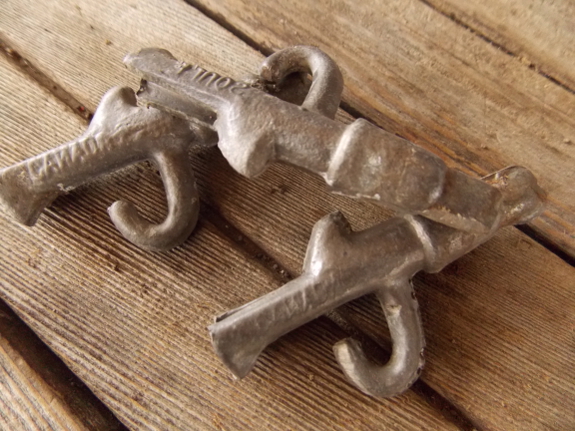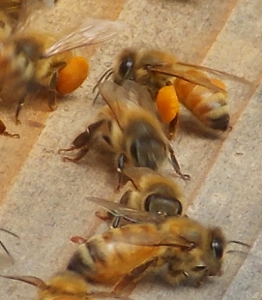
Is it safe to feed maple sap to bees?

Mark mentioned in his last post that we were thinking of tapping some sugar maples and feeding the sap to bees.
I can't decide whether this is a great idea or a terrible idea, since
both sides of the argument are well represented on the internet.
On the plus side, an 1870 article in American Bee Journal
reports that the author sweetened three quarts of maple sap with a pint
of honey and fed the result to his bees. Various websites also
mention modern observations that honeybees will feed on sap coming out
of gashes in maple bark or from cut stumps if weather is warm enough for
them to fly while sap is flowing.
 On
the other hand, other beekeepers warn that maple sap is too high in
solids and will give bees dysentery. At only 1% to 3% sugar, maple
sap has a much lower concentration of sweetness than is found in the
nectars bees prefer (30% and up). At the same time, there are high
concentrations of potassium and calcium in maple sap, which might be
good for the bees...or might make them sick. I'd be particularly
leery of cooking down the maple sap into syrup, since I suspect that
could cause chemical changes that might be bad for the bees.
Instead, I would be more likely to use the sap as the base for making
sugar water for bees.
On
the other hand, other beekeepers warn that maple sap is too high in
solids and will give bees dysentery. At only 1% to 3% sugar, maple
sap has a much lower concentration of sweetness than is found in the
nectars bees prefer (30% and up). At the same time, there are high
concentrations of potassium and calcium in maple sap, which might be
good for the bees...or might make them sick. I'd be particularly
leery of cooking down the maple sap into syrup, since I suspect that
could cause chemical changes that might be bad for the bees.
Instead, I would be more likely to use the sap as the base for making
sugar water for bees.
Why am I thinking of feeding bees at all? The main impetus is our tiny barn swarm colony, which barely had any honey going into the winter
and surely doesn't have much left now. I'm also trying to figure
out a hybrid method between the purely bee-friendly beekeeping I've been
using in recent years, and methods that produce enough honey to allow a
real harvest. My gut feeling is that a round of spring feeding
might boost egg production early enough that we'd get a harvest this
year, without (hopefully) negatively impacting the integrity of the
colony too much. Of course, I could just feed them sugar water,
but the idea of using a free resource from the farm is enticing.
I'd be curious to hear thoughts from beekeepers in the audience.
Would you feed your bees maple sap adulterated with extra sugar?
If you're a natural beekeeper, would you consider feeding your bees in
the spring to boost production?
Want more in-depth information? Browse through our books.
Or explore more posts by date or by subject.
About us: Anna Hess and Mark Hamilton spent over a decade living self-sufficiently in the mountains of Virginia before moving north to start over from scratch in the foothills of Ohio. They've experimented with permaculture, no-till gardening, trailersteading, home-based microbusinesses and much more, writing about their adventures in both blogs and books.
Want to be notified when new comments are posted on this page? Click on the RSS button after you add a comment to subscribe to the comment feed, or simply check the box beside "email replies to me" while writing your comment.

Anna, I heard an interesting comment on one of the new Geoff Lawton YouTube pieces. He made a passing comment about either boiling down the sugar water to make syrup or freezing it and removing the ice. I guess it's like when a soft drink freezes and you take the ice off the top. The rest is super sweet. This would take away the worry of changing the makeup of the syrup with heat. BTW How much snow over there? I'm looking at 9 inches and growing across the mountain in Clintwood this morning.
Mike
You might be safe cooking it down some because the sugars wouldn't caramelize until much higher concentrations and I know that's something beekeepers try to avoid.
Another option is to allow it to freeze. It's not going to be effective as boiling for getting to higher percentages but it will certainly get you out of the single digits. Leave your sap out and skim out any ice that forms.
Hi Anna,
This information is very interesting to me. I'll have to make some time to read more about it. We do not feed our honey bees anything other than their own honey. Our one surviving colony, was given another eight frames of honey with many full cells of pollen last week. This was their second supplemental super this winter. This colony was given eight honey frames at the beginning of Jan. when it was discovered they had already consumed their winter stores. There are still many frames of honey in the two dead colonies. These will be fed to the bees if they need it. During past years we haven't fed for a spring build up. Fortunately, we've been able to harvest enough honey for our table, gift bottles and gallons of mead. We are careful not to be greedy when taking for ourselves. The reserve in the freezer was life saving for our remaining bees this winter. If we didn't have the reserve... we have sugar maples and may consider this as a means of emergency feeding(without added refined cane sugar) if the timing was right. Just this morning, a box of evaporating pans was delivered. This will be our first sugaring season. Looking forward to another new experience. Again, I thank you for offering little known information to us curious folk.